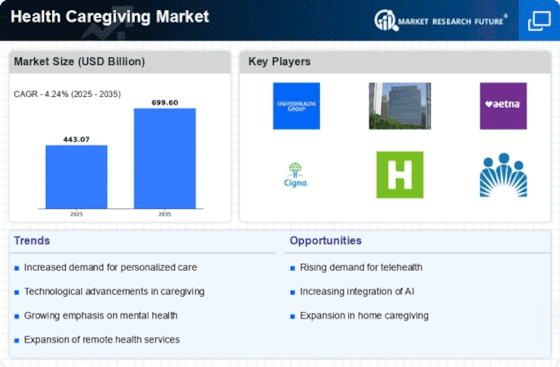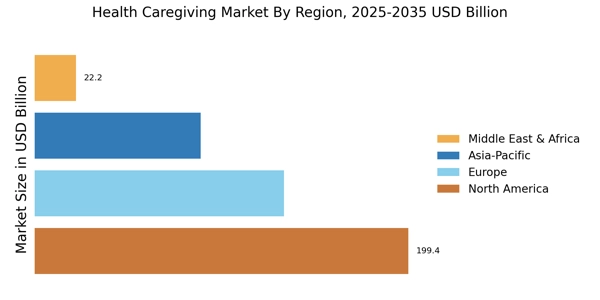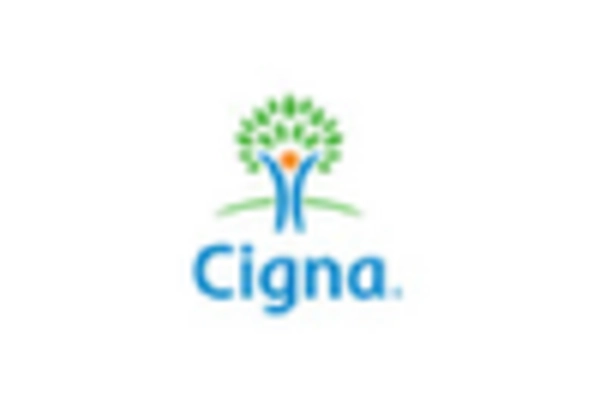Aging Population
The aging population is a primary driver of the Health Caregiving Market. As life expectancy increases, the number of elderly individuals requiring care continues to rise. By 2030, it is projected that nearly 1 in 5 individuals will be over the age of 65. This demographic shift necessitates a robust caregiving infrastructure to support the health and well-being of older adults. The Health Caregiving Market must adapt to meet the diverse needs of this population, including chronic disease management and assistance with daily living activities. Furthermore, the demand for skilled caregivers is likely to increase, leading to potential job growth in this sector. The implications of an aging society extend beyond mere numbers; they encompass the need for innovative care solutions that enhance the quality of life for seniors.
Rising Chronic Diseases
The prevalence of chronic diseases is a critical driver of the Health Caregiving Market. Conditions such as diabetes, heart disease, and arthritis are becoming increasingly common, necessitating ongoing care and management. According to recent statistics, nearly 60% of adults live with at least one chronic condition, which places a substantial burden on caregivers. This trend underscores the need for specialized caregiving services that can address the complexities of chronic disease management. The Health Caregiving Market must respond by developing targeted programs and training for caregivers to effectively support individuals with chronic illnesses. This focus on chronic disease care not only enhances patient quality of life but also alleviates pressure on healthcare systems.
Technological Advancements
Technological advancements are reshaping the Health Caregiving Market in profound ways. Innovations such as telehealth, remote monitoring, and artificial intelligence are enhancing the efficiency and effectiveness of caregiving services. For instance, telehealth services have seen a significant uptick, with a reported increase of over 30% in usage among caregivers. These technologies not only facilitate better communication between caregivers and patients but also enable more personalized care plans. The integration of technology into caregiving practices is likely to improve patient outcomes and streamline operations within the industry. As technology continues to evolve, the Health Caregiving Market must remain agile, adapting to new tools that can enhance service delivery and caregiver training.
Policy and Regulatory Changes
Policy and regulatory changes are influencing the landscape of the Health Caregiving Market. Governments are increasingly recognizing the importance of caregiving services and are implementing policies to support caregivers and improve access to care. For example, recent legislation has expanded funding for home health services and caregiver training programs. These changes are likely to enhance the quality of care provided and ensure that caregivers are adequately supported in their roles. Additionally, regulatory frameworks are evolving to address the needs of diverse populations, including those with disabilities and mental health challenges. The Health Caregiving Market must navigate these changes to align with new standards and capitalize on funding opportunities.
Increased Awareness of Mental Health
Increased awareness of mental health issues is driving growth in the Health Caregiving Market. As society becomes more attuned to the importance of mental well-being, there is a growing demand for caregivers who are trained to address mental health needs. This shift is reflected in the rising number of programs aimed at integrating mental health support into caregiving practices. Research indicates that nearly 20% of adults experience mental health challenges, highlighting the necessity for caregivers to be equipped with the skills to provide appropriate support. The Health Caregiving Market must prioritize mental health training and resources to meet this demand, ultimately improving the overall quality of care and support for individuals facing mental health issues.

















